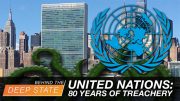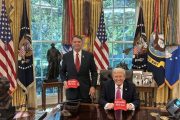Among the bombshells overlooked by many in the testimony offered by former FBI Director James Comey Thursday is the fact that he stopped just short of denying that there is any collusion between the Trump campaign and “the Russians.” While he pulled up just short of that, he did say that the New York Times report to that effect was “almost entirely wrong.”
That Times article — claiming to be based on statements by intelligence sources with inside information — is at the heart of the narrative that Trump is a “puppet” of Putin. Now that it has been dismissed as false by Comey, the wheels have come off the anti-Trump cart, whether those riding in it realize that or not. Comey’s remarks about that report are separated by an hour and 16 minutes and questions from 10 members of the Senate Intelligence Committee. Perhaps the passing of that much time and the multiplicity of questions separating his remarks made it difficult for the “journalists” in the liberal mainstream media to follow. But when taken together, Comey’s answers to the questions asked by Senators Jim Risch (R-Idaho) and Tom Cotton (R-Ark.) are damning to the narrative so loved by the liberal mainstream media that people within the Trump campaign colluded with Russian agents during (and perhaps, they imply, since) the election cycle.
After securing a definitive answer from Comey that Trump was not the subject of an FBI investigation, Senator Risch turned his question to the heart of the matter: collusion. He asked Comey, “I remember, you talked with us shortly after February 14th, when the New York Times wrote an article that suggested that the Trump campaign was colluding with the Russians. Do you remember reading that article when it first came out?”
Before we get into Comey’s answer to that question and the questions which followed, let’s revisit that report by the Times. Entitled “Trump Campaign Aides Had Repeated Contacts With Russian Intelligence,” the article said:
Phone records and intercepted calls show that members of Donald J. Trump’s 2016 presidential campaign and other Trump associates had repeated contacts with senior Russian intelligence officials in the year before the election, according to four current and former American officials.
American law enforcement and intelligence agencies intercepted the communications around the same time they were discovering evidence that Russia was trying to disrupt the presidential election by hacking into the Democratic National Committee, three of the officials said. The intelligence agencies then sought to learn whether the Trump campaign was colluding with the Russians on the hacking or other efforts to influence the election.
And:
The officials said the intercepted communications were not limited to Trump campaign officials, and included other associates of Mr. Trump. On the Russian side, the contacts also included members of the government outside of the intelligence services, they said. All of the current and former officials spoke on the condition of anonymity because the continuing investigation is classified.
Pretty damning stuff, if it were true. But it is not.
Comey answered Risch’s question about whether he remembered “reading that article when it first came out” by saying, “I do, it was about allegedly extensive electronic surveillance in their communications.” Risch followed up with, “Correct. That upset you to the point where you surveyed the intelligence community to see whether you were missing something in that. Is that correct?” Comey agreed, but reminded Risch that the topic may lead to classified matters, which would need to wait until the closed session that was to follow Comey’s open session testimony before the committee.
Risch said, “I’m not going to go any further than that, so thank you. In addition to that, after that, you sought out both Republican and Democrat senators to tell them that, ‘Hey, I don’t know where this is coming from, but this is not the case. This is not factual.’ Do you recall that?” Comey answered, “Yes.”
Let that sink in for a moment. Comey testified that he had “surveyed the intelligence community” after the Times article was published “to see whether” he was “missing something” since the claims of the article were news to him. Then, upon finding out that he was correct — and that the article was not — he “sought out both Republican and Democrat senators to tell them that” the article was not true and that there was no record of any surveillance showing “that members of Donald J. Trump’s 2016 presidential campaign and other Trump associates had repeated contacts with senior Russian intelligence officials in the year before the election.”
Risch’s next question was pointed and direct. “Okay. So again, so the American people can understand this, that report by the New York Times was not true. Is that a fair statement?” Comey’s answer was, well, less direct, but still damning to the Trump/Russia conspiracy advocates. He said:
In the main, it was not true. And again, all of you know this. Maybe the American people don’t. The challenge — and I’m not picking on reporters about writing stories about classified information — is the people talking about it often don’t really know what’s going on, and the people who do know what’s going on are not talking about it.
We don’t call the press to say, “Hey, you got that thing wrong about the sensitive topic.” We have to leave it there.
Of course, Comey’s nuanced bit about the article not being true “in the main” leaves much to be desired. Apparently, Senator Cotton thought so, too. He revisited the issue during his time questioning Comey, asking, “On February 14th the New York Times published the story, the headline of which was ‘Trump campaign aides had repeated contacts with Russian intelligence.’ You were asked if that was an inaccurate story. Would it be fair to characterize that story as almost entirely wrong?” Here is the meat of the matter. Scratch the nuanced answers. Was the story just plain wrong? Comey’s answer, was — in a word — “Yes.”
If one takes the time to boil all of this down to its broth, here is what it is: The New York Times produced, published, and propagated fake news claiming there were repeated contacts — and implying there was collusion — between the Trump campaign and Russian entities including Russian intelligence agents and officials. That story, having been canonized by other liberal mainstream media and Trump’s political enemies, was used to attack Trump in an attempt to deligitimize his presidency.
And Comey — no friend of the Trump administration — drove a stake through the heart of that story in sworn, public testimony before a body that already knew the story was not true.





